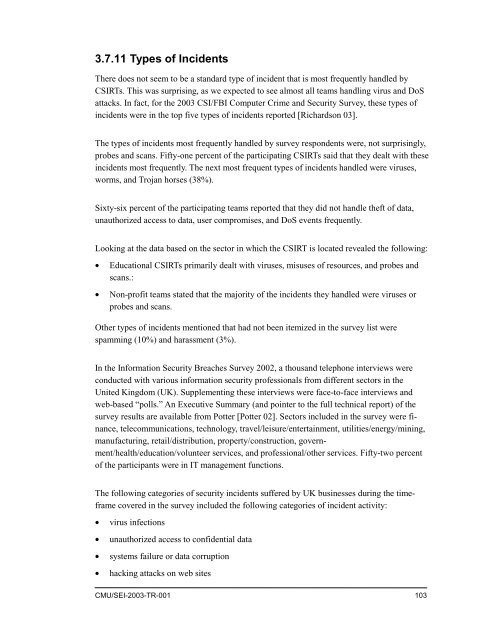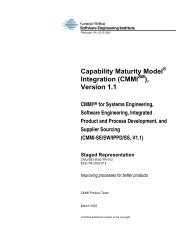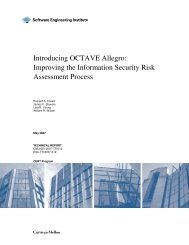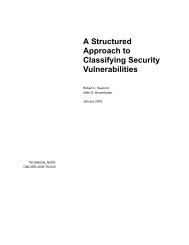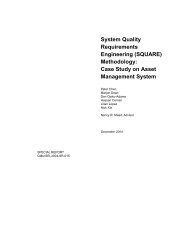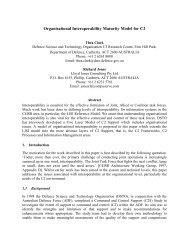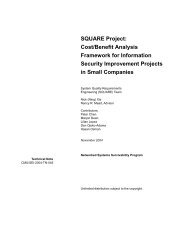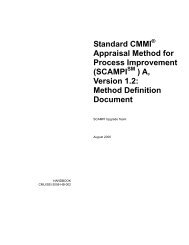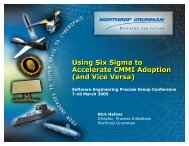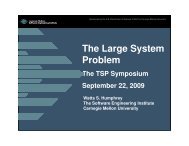State of the Practice of Computer Security Incident Response Teams ...
State of the Practice of Computer Security Incident Response Teams ...
State of the Practice of Computer Security Incident Response Teams ...
You also want an ePaper? Increase the reach of your titles
YUMPU automatically turns print PDFs into web optimized ePapers that Google loves.
3.7.11 Types <strong>of</strong> <strong>Incident</strong>s<br />
There does not seem to be a standard type <strong>of</strong> incident that is most frequently handled by<br />
CSIRTs. This was surprising, as we expected to see almost all teams handling virus and DoS<br />
attacks. In fact, for <strong>the</strong> 2003 CSI/FBI <strong>Computer</strong> Crime and <strong>Security</strong> Survey, <strong>the</strong>se types <strong>of</strong><br />
incidents were in <strong>the</strong> top five types <strong>of</strong> incidents reported [Richardson 03].<br />
The types <strong>of</strong> incidents most frequently handled by survey respondents were, not surprisingly,<br />
probes and scans. Fifty-one percent <strong>of</strong> <strong>the</strong> participating CSIRTs said that <strong>the</strong>y dealt with <strong>the</strong>se<br />
incidents most frequently. The next most frequent types <strong>of</strong> incidents handled were viruses,<br />
worms, and Trojan horses (38%).<br />
Sixty-six percent <strong>of</strong> <strong>the</strong> participating teams reported that <strong>the</strong>y did not handle <strong>the</strong>ft <strong>of</strong> data,<br />
unauthorized access to data, user compromises, and DoS events frequently.<br />
Looking at <strong>the</strong> data based on <strong>the</strong> sector in which <strong>the</strong> CSIRT is located revealed <strong>the</strong> following:<br />
• Educational CSIRTs primarily dealt with viruses, misuses <strong>of</strong> resources, and probes and<br />
scans.:<br />
• Non-pr<strong>of</strong>it teams stated that <strong>the</strong> majority <strong>of</strong> <strong>the</strong> incidents <strong>the</strong>y handled were viruses or<br />
probes and scans.<br />
O<strong>the</strong>r types <strong>of</strong> incidents mentioned that had not been itemized in <strong>the</strong> survey list were<br />
spamming (10%) and harassment (3%).<br />
In <strong>the</strong> Information <strong>Security</strong> Breaches Survey 2002, a thousand telephone interviews were<br />
conducted with various information security pr<strong>of</strong>essionals from different sectors in <strong>the</strong><br />
United Kingdom (UK). Supplementing <strong>the</strong>se interviews were face-to-face interviews and<br />
web-based “polls.” An Executive Summary (and pointer to <strong>the</strong> full technical report) <strong>of</strong> <strong>the</strong><br />
survey results are available from Potter [Potter 02]. Sectors included in <strong>the</strong> survey were finance,<br />
telecommunications, technology, travel/leisure/entertainment, utilities/energy/mining,<br />
manufacturing, retail/distribution, property/construction, government/health/education/volunteer<br />
services, and pr<strong>of</strong>essional/o<strong>the</strong>r services. Fifty-two percent<br />
<strong>of</strong> <strong>the</strong> participants were in IT management functions.<br />
The following categories <strong>of</strong> security incidents suffered by UK businesses during <strong>the</strong> timeframe<br />
covered in <strong>the</strong> survey included <strong>the</strong> following categories <strong>of</strong> incident activity:<br />
• virus infections<br />
• unauthorized access to confidential data<br />
• systems failure or data corruption<br />
• hacking attacks on web sites<br />
CMU/SEI-2003-TR-001 103


